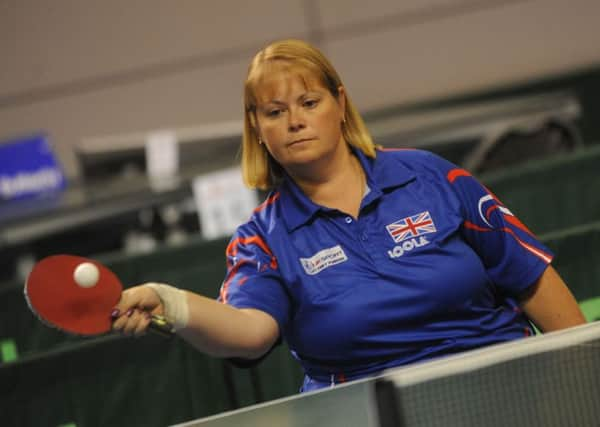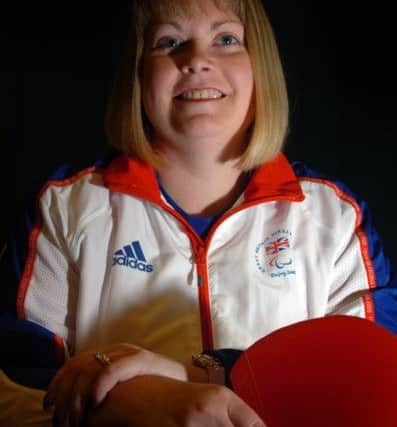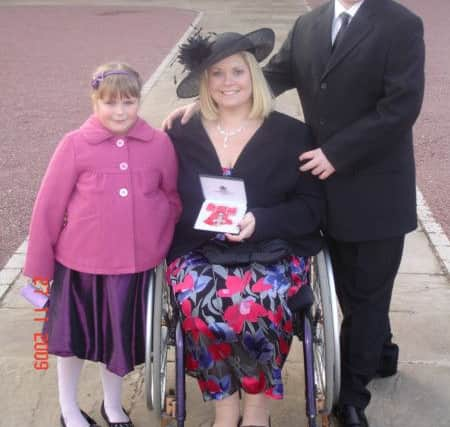Sue goes for gold at fifth attempt at Rio paralympics


“I just don’t feel it’s safe,” says the 43-year-old Barnsley teacher and table tennis ace. “Of course I want them with me but I would just be worrying about them rather than focusing on my game.”
Ironically it is really because of her children than she endures the constant pain in order to continue at the top of her sport.
Advertisement
Hide AdAdvertisement
Hide AdSue suffers from Ehlers Danlos, a degenerative muscle and ligament disease that causes up to 70 dislocations of her joints everyday . Due to being misdiagnosed for 20 years she was told she couldn’t pass it on to her children and so started a family with husband Stephen


But then a correct diagnosis in 2006 confirmed she was suffering from an hereditary condition and now both her children, Ryan and Lauren, have been diagnosed.
“I want to show them that you can succeed and achieve your dream no matter what.”
There may have been doubts about the funding and the organisation of Rio 2016 paralympics, but Susan Gilroy remains focussed and says she is playing the best table tennis of her career and believes she in with a real chance of an Olympic medal, the only medal to have alluded.
Advertisement
Hide AdAdvertisement
Hide AdIt was failure to win a medal at London 20120 that saw her dropped from Team GB, despite still being fourth in the world.


“I had terrible problems with my shoulder and so I didn’t perform as well as I should have done, but then to be told you are out of the team and lost your funding is pretty hard.”
But no one is going to tell this determined South Yorkshire lass when it is time to retire.
Rather than give up she found her own coaching team and spent the majority of her teaching salary getting back on top and eventually back into the team.
Advertisement
Hide AdAdvertisement
Hide Ad“I was determined to show them that I wasn’t rubbish. I wanted to leave on my terms. Ironically I think two years on my own did my game a world of good, but it is great to be back on Team GB - is like my second home.”


The fact Sue is able to play the frenetic game of table tennis which is played at break neck speed, at all is almost unbelievable.
Her condition means that her right wrist has had to be fused due to constant dislocations and she has limited use of her right shoulder which was what caused her problems in London after which she needed further surgery..
“We play at a faster speed than the able bodied players,” explains Sue.”Because we are in wheelchairs we have to play close to the table and therefore play the ball even sooner.”
Advertisement
Hide AdAdvertisement
Hide AdSue was a very sporty child and excelled at a number of different sports. She started playing table tennis when she was 15 as both her parents played, although she had started to suffer from dislocated joints from the age of 11.


And by 18 she was forced to give up the sport she loved and any hope she had of becoming a teacher when she was told she would spend the rest of her life in a wheelchair.
“It was devastating,” she recalls. “You just think your life has come to an end and that you can’t do anything that you did before. I was really outgoing: I was a drummer in a band, I played lots of sport. All that went, almost overnight. I became a bit of a recluse.
“I didn’t even know you could play sport from a wheelchair, I was 18 and I thought my life was over. It was a terrible time. I couldn’t imagine my life without sport.”
Advertisement
Hide AdAdvertisement
Hide AdBut then she saw an advert for a disabled sports club in Hoyland.
“I didn’t have clue what kind of sports you could do from a wheelchair, it was all so new to me.”
“I decided to go a long and find out. There were all these other people there in wheelchairs and for the first time I felt normal.”
Susan tried lots of different wheelchair sports including table tennis, archery and shooting.
Advertisement
Hide AdAdvertisement
Hide Ad“At the national championships I got spotted by some from Team GB and was told I had to choose.” Of course she chose her first love table tennis.
Sue competed in her first European Championships in 1998 and was European champion in 2005, having won silver in 2003 when seven and a half months pregnant. She took gold in the Commonwealth Games in Manchester in 2002 and again in Melbourne in 2006. She has been British national champion 19 times and has won hundreds of International medals over the last 18 years.
Rio will be her fifth Olympics and if everything goes according to plan she should come away with a medal.
“You can’t ever take anything for granted in table tennis though,” says Sue. “It is such a quick game that just a lapse of concentration and it can all be over.”
Advertisement
Hide AdAdvertisement
Hide AdBut it isn’t just in sport where she has succeeded. Despite being forced to leave university when she was 18, she has spent the last 15 years as a full-time primary school teacher working at Shawlands Primary School in Barnsley.
She also does a lot of charity work with Rainbow House, disabled children’s charity, and Cancer Research and in 2009 she received an MBE and an Honorary Doctorate for her services to table tennis and her charity work. She has also worked as an Ambassador for Sport England for many years, running various table-tennis workshops and talks.
Sue has never let her condition hold her back and now she wants the same for her children, although she finds it hard.
“They are both really sporty kids and I am so proud of how they are dealing with it.”